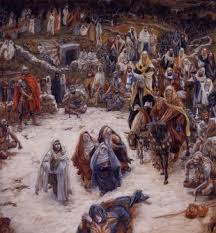Good morning everyone,
Today, the Church celebrates the liturgical Memorial of Saint Pius V (17 January 1504 to 1 May 1572). Antonio Ghislieri served as Pope from the day of his election to the See of Peter on 8 January 1566 until his death. This was not an easy time to lead the Church. There were many questions about unity that needed to be delicately attended to, and it was Saint Pius V who faced this task. He gained a reputation for putting orthodoxy before personalities.
Being objective in judgement was also a crucial requisite for Nicodemus, the Pharisee mentioned in Saint John's gospel: the one who met with Jesus in the dark of night. Nicodemus had to be objective in his questioning. He had to set aside any prejudice that may have existed in order to make room in his heart to welcome the Word that Jesus proclaimed: a word that is eternally young, ever fresh.
Jesus invites us all to hear these same words and to be as objective as we can in exploring the truth that his words bear. It is - as a wise and holy man once said - when we dare to pray through the questions of our faith - that we come to believe the truth that the Son of Man must be lifted up so that those who believe in him may have eternal life (Jn 3:15).
Have a great day.
Today, the Church celebrates the liturgical Memorial of Saint Pius V (17 January 1504 to 1 May 1572). Antonio Ghislieri served as Pope from the day of his election to the See of Peter on 8 January 1566 until his death. This was not an easy time to lead the Church. There were many questions about unity that needed to be delicately attended to, and it was Saint Pius V who faced this task. He gained a reputation for putting orthodoxy before personalities.
Being objective in judgement was also a crucial requisite for Nicodemus, the Pharisee mentioned in Saint John's gospel: the one who met with Jesus in the dark of night. Nicodemus had to be objective in his questioning. He had to set aside any prejudice that may have existed in order to make room in his heart to welcome the Word that Jesus proclaimed: a word that is eternally young, ever fresh.
Jesus invites us all to hear these same words and to be as objective as we can in exploring the truth that his words bear. It is - as a wise and holy man once said - when we dare to pray through the questions of our faith - that we come to believe the truth that the Son of Man must be lifted up so that those who believe in him may have eternal life (Jn 3:15).
Have a great day.






